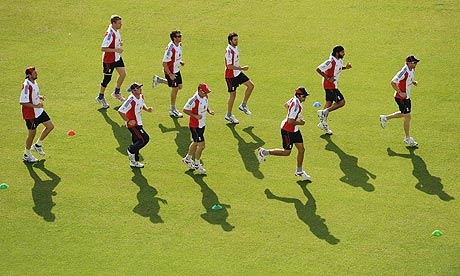Fifth Test
Fear rather than fervour marks England's final push for glory
The build-up to the final Test has been blighted by a depressing feeling of inevitability following the rout at Headingley
-

- The Guardian, Thursday 20 August 2009

The England squad warm-up at The Oval ahead of the fifth and decisive Test against Australia. Photograph: Tom Jenkins/Tom Jenkins
It was hard to pinpoint but there was something missing at The Oval yesterday. England practised hard and then in the afternoon, so did Australia. Andrew Strauss was earnestly booming, Ricky Ponting confident without being complacent. And in the middle, the 22 bleached yards of Kennington turf on which the Ashes will be decided were baking in the sun as they have been for the past few days.
The game is set: one all with one to play, not winner takes all because Australia, as holders, simply have to not lose. For one final time, we have to cast back four years to the fevered atmosphere that preceded that game. Tickets were gold dust, apartments with even a restricted view of the ground were hired, and giant ambush marketing banners bedecked the gasholder. On the Guardian website, a blogger wondered if it was cowardly to pray for rain.
This game, a marketing dream in theory, appears to lack the same atmosphere, the same level of expectation. Hospitality packages suddenly have become available in the past week or so. Supermarkets are offering promotions on Australian beer as if anticipating a celebration. Perhaps it is the depressing feeling of inevitability after all the hope engendered in the middle of the series. The first four days are a sell-out and have been since November, but the talk after Headingley is of the unstoppable Australian juggernaut, England damage limitation, and a hurrah for Fred. Whatever happens, Andrew Flintoff will get a send-off to remember.
Headingley was a disaster for England with no single redeeming feature. Not until the outcome of the game was clear were wickets taken and runs scored. They were cosmetic, meaningless. Ravi Bopara was deemed so shot that he has been omitted and a debutant, Jonathan Trott, called in to face rampant Australians in perhaps the highest-profile match, for the highest stakes, he will ever play. The week's break will have given England time to reflect, get things out of the system, and start afresh, but there is no sense that Australia will lose the momentum that began with Michael Clarke's century in the second innings of the third Test.
For England to win, nothing fewer than 20 Australian wickets will suffice, something they have been unable to achieve in any match other than that at Lord's. They can expect no glimmer from the Australians who, given the chance, will bat them into oblivion before any thoughts of actually winning the game.
England's batting side is already picked, and there is little reassurance in the prospect of Ian Bell resuming a position in which he has manifestly failed. For the future now, but when Kevin Pietersen returns he must take the responsibility at No3, the position to which great players, particularly if they are the only great player in the team, ought to aspire. Correctly, Trott will not be exposed too early, coming in at five, below Paul Collingwood, who moves up to four. All three face a massive test of character, skill and technique. From the periphery, confidence in this middle order is shaky. Now there is a chance to prove otherwise.
The key decision, one which Strauss and Andy Flower will mull over right through to this morning, is the balance of the bowling attack. Should they go with four seamers and a single spinner, or back two spinners and a trio of seamers, one of whom is in danger of falling apart at any stage. England had assembled all their bowling resource, although the presence of Ryan Sidebottom has almost certainly been a practical measure to give practice against the sort of left-arm inswing that Mitchell Johnson has occasionally produced without quite seeming to know when.
Judging the pitch will be crucial but it is an inexact science. Bill Gordon's surfaces always look pristine, best-in-show and this is no different, not hugely grassed but evenly so. Tales of pace are misguided: these pitches are not sluggish but neither do they have the pace and bounce of a decade ago. If the weather generally holds – heavy showers are forecast today but with cooler but clearer conditions thereafter – then the ball will abrade on the pitch and the bare practice pitches to the side and reverse swing. But will there be turn? The lack of positive results in county games here this year suggest that the pitches do not break up, but championship matches are held over four days not five: a lot can happen in a Test on the final afternoon.
The indications, though, are that already Graeme Onions has been factored out of the equation and that Steve Harmison, who has bowled significantly better on this ground than most others, and Jimmy Anderson, along with Flintoff, the best exponent of reverse swing, factored in. This then leaves a straightforward decision between Stuart Broad and Monty Panesar; seam versus spin. It is a difficult choice for Broad's bowling has been ordinary and Panesar's season in the county championship second division abysmal. This pitch, though, while it will not disintegrate, will not have been prepared to last and in this circumstance, although Graeme Swann and Panesar are hardly Laker and Lock, they may offer England their best chance.
Australia have no such dilemmas. So competent has their batting become that if they do their collective job and post the sort of total from which England have no comeback, then it does not much matter who bowls. With Clarke, Marcus North and Simon Katich all capable of filling in with spin, there is no reason to alter a thing. An unchanged side is the likeliest option.
- guardian.co.uk © Guardian News and Media Limited 2009
No comments:
Post a Comment